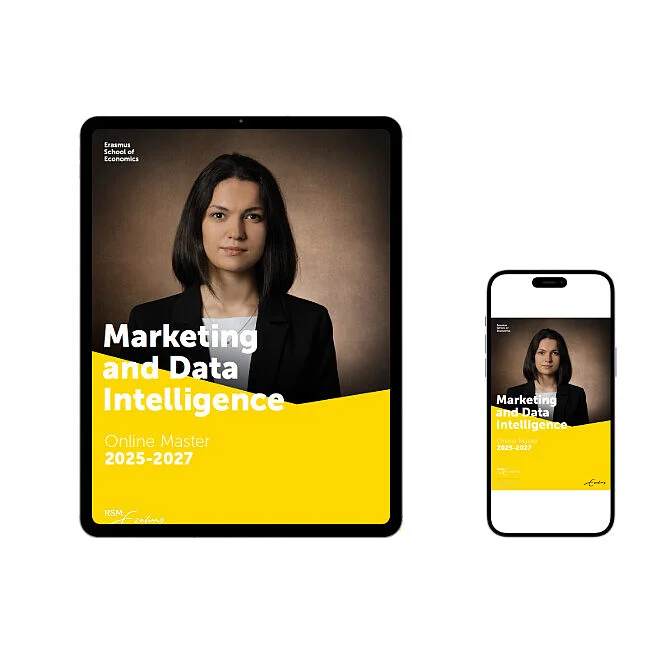

This programme is offered by Rotterdam School of Management b.v.. For more information about the legal structure of Rotterdam School of Management, Erasmus University, visit this page.
Designed with flexibility, to fit around your life. Access high-quality education and connect with top academic faculty through interactive weekly live sessions, regardless of location.
Switch careers, accelerate career progression and stand out in a competitive job market by gaining expertise in marketing, advanced data analytics and AI.
ESE is home to Europe’s top-ranked marketing science group. Learn from top experts in their fields and active researchers.
Learn in-demand data science tools and methods like R programming, visualisation, and machine learning for marketing decision-making.
In today’s digital world, every click creates data. Marketers who know how to use that data make better decisions and stay ahead. With the Online Master Marketing and Data Intelligence from Erasmus School of Economics you'll be able to do just that: turn data into smart marketing to solve business challenges.
The programme combines data science, econometrics, and AI to give you a holistic and practical understanding of modern marketing. You’ll learn to bridge marketing and technology, explain complex insights clearly, and anticipate trends, preparing you for high-impact roles like data translator, marketing data scientist, marketer or digital marketer.
You’ll gain the same skills used by companies like Amazon, Netflix, and Unilever to personalise customer experiences, predict behaviour, and drive growth. With courses in AI, consumer analytics, and digital strategy, you’ll be ready to lead where marketing meets data.
Your next step starts here.
Watch the video below to learn more about the Master in Marketing and Data Intelligence and meet the faculty at Erasmus School of Economics.

This digital brochure includes detailed information about:
The Online Master Marketing and Data Intelligence lets you study anytime, anywhere, making it easier to balance your career ambitions with work and personal life. But flexibility doesn’t mean distance. Even though the programme is 100% online, it’s designed with a strong human focus at its core.
You won’t just watch recordings, you’ll be able to join live classes, take part in small group discussions, and engage in interactive Q&A sessions that create real conversations with professors and classmates. Faculty members are visible and approachable, offering personal feedback, hosting virtual office hours, and actively participating in discussions so you feel supported throughout your journey.
Beyond the classroom, dedicated learning advisors and programme managers regularly check in to help you stay on track. Through group projects, peer feedback, and discussion forums, you’ll build meaningful connections with fellow students across time zones. There are also informal moments to connect, such as virtual coffee chats, networking events, and alumni meetups, helping you grow your professional network.
Most importantly, the programme allows you to shape your studies around your own goals, creating a learning experience that feels personal, engaging, and tailored to you.
Receive personalised support and regular check-ins from day 1 until graduation. Their role is to ensure smooth course delivery, technical troubleshooting, and your success as a learner.
Highly interactive sessions are organised regularly. You are encouraged to join them to engage and connect with faculty and peers in real time. The live sessions include lectures, panel discussions, and Q&A's.
Network with like-minded professionals from around the world, while building intercultural and professional skills.
The class size is capped to around 40 learners to ensure maximum engagement and foster community.
The programme is delivered fully online through the online campus by RSM via Erasmus University Rotterdam.
A blended learning approach is used, that comprises both live learning sessions and independent study, and which ensures flexibility as well as engagement. This blend empowers participants to engage with the content and peers in a manner that suits individual circumstances, while still fostering a sense of community within your own cohort.
The programme follows a structured and logical sequence of modules that enhance overall focus and group cohesion, and it develops and maintains a strong cohort dynamic. Students can participate effectively regardless of geographical location or time constraints, because of the flexibility provided with the diverse learning materials and formats.
We regularly hosts webinars on AI and data intelligence, diving into insightful topics and with very special guests!
You can watch the full recordings on YouTube.
The Online MSc Marketing and Data Intelligence is for professionals with at least three years of work experience, preferably (but not necessary) in a job that builds on data-driven insights to support the organisation’s marketing decisions.
The master is ideal for professionals who are passionate and curious about emerging technologies, and want to learn how to confidently use in-demand data science tools and methods like R programming, visualisation, and machine learning for marketing decision-making.
The master is also for individuals who are looking to change careers, or accelerate career progression by gaining expertise in marketing, advanced data analytics and AI.
Applications for the Online Master Marketing and Data Intelligence September 2026 intake are now open.
The final application deadline for the September intake is: Wednesday July 15, 2026, 23:59 CET
Given the high number of applications we receive, we kindly encourage you to submit yours as early as possible. Doing so will allow ample time for processing and increase the likelihood of securing your place.
As a learner, you are expected to commit to around 16 hours of studying a week during the lecture periods.
The adoption of artificial intelligence and the growing use of data is positively affecting the job market in several ways, most notably by creating a strong new demand for skilled professionals working at the intersection of marketing and data science. This trend is evident across various sectors and is reshaping workforce dynamics.
Graduates can potentially enter roles such as:
Yes, we offer different ways to finance your master, such as payment plans.
There is also a wide range of scholarships and incentives now available for applicants (which can range from €500-€2000 off your tuition fees).
Please click here to read more about financing your online master.
Applicants may submit their English language proficiency certificate either during the application process or at a later stage.
Kindly note that, in accordance with our admissions policy, we are unable to issue an official offer letter and therefore cannot confirm your place in the programme until we have received and verified your English proficiency test results.
For more details on the accepted tests, minimum subscore and minimum total score, please click here.
A Bachelor degree or International Baccalaureate taught entirely in English is not sufficient grounds for an exemption from the English language proficiency certificate. Exemptions are granted in the following cases:
Please note: The Admissions Board will make the final decision on granting you an exemption for the English language test based on the above mentioned criteria. If you believe that you can be exempted from the English test and it's not mentioned in the above mentioned criterias, please email onlinemasters@rsm.nl, however, please note that this does not guarantee that you will be exempted from the English test.
During the Online MSc Marketing and Data Intelligence learners do not have to write a thesis.
Instead, throughout the master programme, learners work towards mastering a set out Intended Learning Outcomes (ILOs). As they progress, they build an ILO scoreboard that shows their achievements for each ILO at the programme level. To graduate, learners must meet all the ILOs.
As ILOs represent the final learning goals, more weight is given to results from modules in the second year of the programme.
This online master is a collaboration between Erasmus School of Economics, Erasmus University Rotterdam, and RSM BV.
With Online Master Marketing and Data Intelligence you will have access to content from Erasmus School of Economics and to their faculty, who are experts in their fields and active researchers.
RSM BV is responsible for the execution and delivery of this programme on behalf of Erasmus School of Economics. All inquiries regarding the programme, including contractual matters, should be directed to RSM BV. Upon successful completion of the programme and fulfilment of all requirements, graduates will receive a MSc degree in Marketing and Data Intelligence from Erasmus University Rotterdam.
For more information about the legal structure of Rotterdam School of Management BV, click here.
Are online master’s graduates eligible for the Orientation (search) year permit in the Netherlands after graduation?
Yes, Online Master’s learners may be eligible for the orientation (search) year permit in the Netherlands. This permit allows you to stay in the Netherlands for up to one year after graduation to look for employment.
Please note that applications for the orientation (search) year permit are submitted directly to the IND. As a result, the university is unfortunately unable to support graduates with this application process.
For further details and official requirements, please visit: Residence permit for orientation year | IND
Check all the FAQs and have all your questions answered.
Do you have other questions?